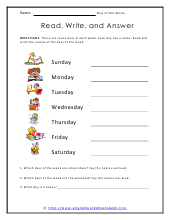Days of The Week Worksheets
Related ELA Standard: L

Sunday, Monday, Tuesday, Wednesday, Thursday, Friday, Saturday! Sing it with me. Naming the days of the week is one of the first utility types of activities we teach to children at any early age. Some teachers will start with Sunday and end on Saturday. Others will start on Monday and run off on Sunday. This is all a matter of choice, but most calendar formats start with Sunday which I often default to for my students. These worksheets will help student begin to remember the sequence of the days of the week.
Days of the Week Worksheets To Print:
Word Scramble! - The days are all confused. Clean them up. Unscramble the letters and write the word on the lines.
Read, Write, and Answer - The title, pretty much, says it all. You will associate each name with a picture and mood or tone.
Spelling Practice - The days are all missing a few letters. Finish them off. You may need to use capital letters, at times.
Days and Months - Do not forget to capitalize the Days of the week and months.
Order Up! - Most calendars have Sunday as the first day of the week. Even though we commonly feel it is Monday.
Abbreviations - Take those three letters to the bank. An abbreviation is a word that has been shortened. Can you match
the days of the week with their abbreviations?
Fill Ins - Think up the missing letters and then write the whole word too. A great rote practice activity that holds a great deal of value.
Order Of Days - Again we start with our Monday. We explore the sequence a bit more.
Word Search - Find each day of the week in the puzzle below. Write each day you find on a line.
Correct the Anchor - Write the days of the week, in their correct order. You do this from your memory. Fire away!
Lots of Questions - Some of the questions are from left field or right field. Which ever one is way out there!
Order - Write the correct sequence based of off the starting day that you choose.
Tracing - Trace the words for practice forming letters.
My Favorite - Complete the sentence and share your favorite portion of the week.
Scrambled - Unscramble the letters to spell and capitalize appropriately.
Sequence - Create the correct sequence from each starting point.
Finish It Up - Fill in the missing letters. Capitalize as needed.
Shortened - An abbreviation is a word that has been shortened.
Missing - What is missing in each of these lines.
About the Days of the Week
Sunday always starts out fun, but by mid-afternoon we realize our weekend is about to come to an end. This is the day of rest in most places around the world. Because of this many European countries hold their elections on Sundays. Mondays are usually the least liked day of the week by most people, mostly because it summons the start of the workweek. Statistically, Monday is the best day for the world's stock markets. Worker productivity is also the lowest on Monday. People aren't thrilled with Tuesdays, but they do like them a bit more. Tuesday is often the most productive workday for all employees. Wednesday is considered Hump Day. In Slavic languages Wednesday translates to “the middle” which very fitting. This is the marker that we need to reach to assure that we are headed towards the weekend. Thursday is often the day that most Americans collectively watch television. Might have to do with the fact that they are ready to settle down a bit to enjoy the weekend. In a recent poll of just under a half-million Americans, Fridays were the crowd favorite day of the week. We feel there are fewer consequences for anything we do on Fridays. It doesn't hurt that it is also seen as the universal payday. Saturday is often seen as the day to sleep in and be lazy.
The Ancient Babylonians are credited with developing the sevens days of the week. The names of these days often were put together by the Norse people during the early Middle Ages. The names were used to commemorate their cultures gods and goddess. In fact, as every major civilization began to take shape they replaced those names to reflect the gods and goddess that they worshiped.
How They Got Their Names
Monday gets its name for the moon’s day. In ancient Nordic cultures the second day of the week is dedicated to worshipping the goddess of the moon. Tuesday is named for Mars the god of law and war. Wednesday is named after a mix of Wodan the Germanic god and the Roman god of war Mercury. Thursday is named as such for the god of Thunder and lightning named Jupiter and in English, it derives the name from Thor the Norse god of war. Friday gets the name from the Old English for “day of Frigg”. Frigg referring to the Norse goddess of fertility, love, and some thought marriage. Saturday is often a day associated with fun because we often have less responsibilities. This day’s name is retained from the Roman culture to celebrate their god Saturn who is associated with ruling Earth during the ages of happiness and virtue. Sunday takes multiple views based on the culture that you are viewing it from. It either comes first or last on your calendar based on the culture you are from. This is agreed by most cultures to be the universal day of rest. The name comes from the day of the Sun, our only star in our galaxy.

